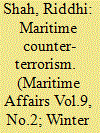| Srl | Item |
| 1 |
ID:
126687


|
|
|
|
|
| Publication |
2013.
|
| Summary/Abstract |
Centre-state relations in India are a fascinating area of studies. The structure of the relationship has an effect on every single aspect of life as we know it in India. This paper is an attempt to study centre-state relations in the context of India's maritime counter-terrorism strategy. Although the Government of India has not publicly stated its counter-terrorism strategy on the sea, intelligence, information sharing, crisis response, finances for internal security and the nation's legislation for battling terrorism together comprise India's maritime-terrorism strategy. Through study of these areas, the paper argues that the centre-state divide has had systemic implications on India's maritime security and has largely done more harm than good to collective initiatives that aspire to prevent future risk of terrorism from the sea or on the sea.
|
|
|
|
|
|
|
|
|
|
|
|
|
|
|
|
| 2 |
ID:
124161


|
|
|
|
|
| Publication |
2013.
|
| Summary/Abstract |
This paper aims to develop a better understanding of the economic situations of South Asian minorities in Hong Kong. A theoretical perspective emphasizing the embedding of economic behavior within social relationships and socio-political processes will be employed. This study will examine how three macro-historical processes, namely, colonization, industrialization and globalization, induce the different configurations of three structural factors, namely, government policy, societal reception and co-ethnic community, affecting the economic wellbeing of South Asian minorities in Hong Kong. The authors argue that Hong Kong Chinese and South Asians coexisted peacefully without major conflict or discrimination during the early colonial age. However, when the colonial government started to develop unique Hong Kong Chinese identity and as the HK Chinese became wealthier, well-educated and successful, ethnic tensions began to occur. In this era of globalization, Hong Kong encounters the serious problem of economic restructuring, and the continuous inflows of migrants from developing countries engender keen competition with lower-class Hong Kong citizens for low-end service jobs. South Asians are no longer enjoying positive societal reception from the Hong Kong Chinese. The co-ethnic community factor for Hong Kong South Asians has not significantly changed since the pre-war years. Their sub-communities' internal resources may secure their economic wellbeing through mutual assistance. However, under a very harsh external environment, whether sufficient resources can still be continuously drawn remains questionable.
|
|
|
|
|
|
|
|
|
|
|
|
|
|
|
|